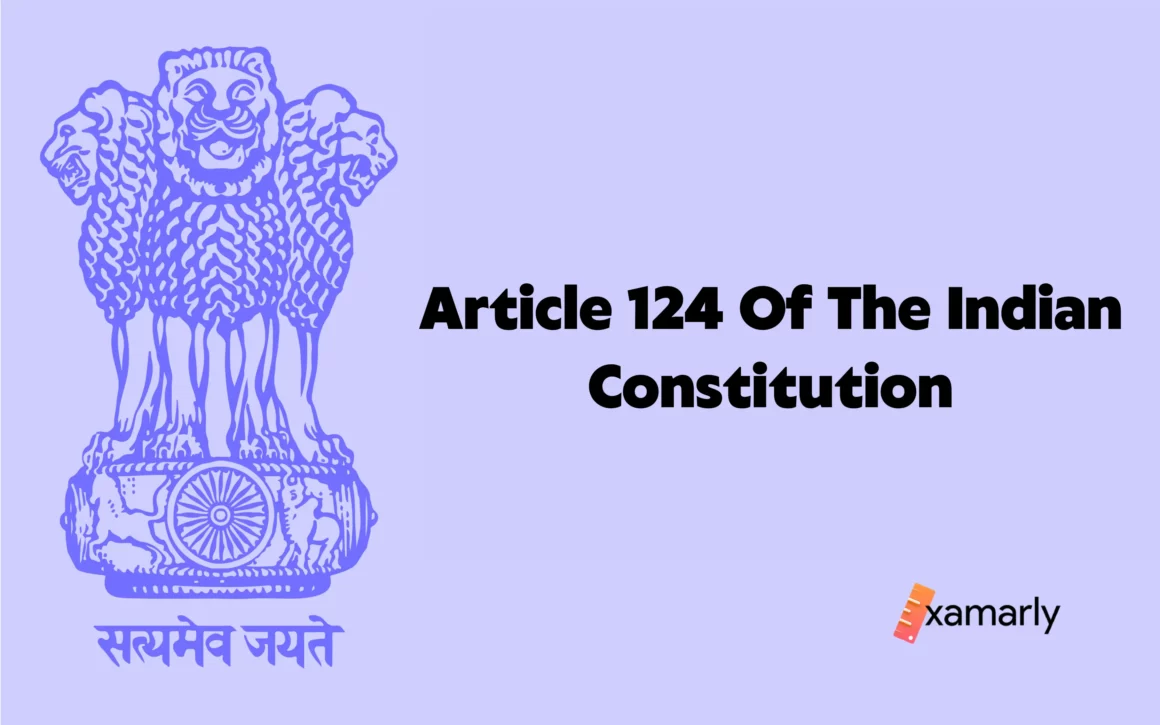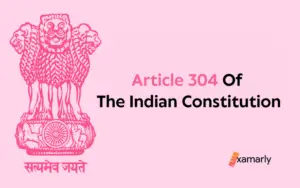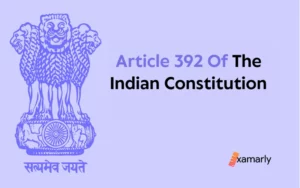An Overview
- An Overview
- Article 124 Of The Indian Constitution – In Detail
- Clause 1 – As it is & Explained
- Clause 2 – As it is & Explained
- Clause 2A – As it is & Explained
- Clause 3 – As it is & Explained
- Clause 4 – As it is & Explained
- Clause 5 – As it is & Explained
- Clause 6 – As it is & Explained
- Clause 7 – As it is & Explained
- Article 124A Of The Indian Constitution
- Article 124B Of The Indian Constitution – In Detail
- Article 124C Of The Indian Constitution – In Detail
- Relevancy of the 99th Amendment Of The Indian Constitution
- Summing Up
- FAQs
- What is Article 124 Clause 2 of the Indian Constitution?
- What is the provision in the Constitution for the number of judges in the Supreme Court?
- Can be there more than one Chief Justice of the Supreme Court?
- Who appoints the Chief Justice of the Supreme Court?
- What is Article 124 Clause 7 of the Indian Constitution say?
- How is the 99th amendment of the Indian Constitution related to Article 124 of the Indian Constitution?
- What does the second clause of Article 124A say?
- Who can make the laws regarding the Supreme Court and Chief Justice of India and the other judges?
- Is Article 124a repealed?
Article 124 of the Indian Constitution is one of the most important Articles among others. We can also say that Article 124 of the Indian Constitution is among those Articles that are the building blocks of our judicial ecosystem.
Article 124 of the Indian Constitution lays down the framework for the formation of the Supreme Court and the panel of judges that would regulate important jurisdictions.
This article will provide us insights into the appointment of judges of the supreme court and the resignation of the judges.
Article 124 Of The Indian Constitution – In Detail
We will understand the concept of Article 124 Of The Indian Constitution in detail by analyzing each and every clause present in the Article.
Clause 1 – As it is & Explained
124. Establishment and constitution of Supreme Court
(1) There shall be a Supreme Court of India constituting of a Chief Justice of India and, until Parliament by law prescribes a larger number, of not more than seven other Judges
The first clause of Article 124 of the Indian Constitution says that there will be a body known as the Supreme Court of India which will consist of a Chief Justice as head of the Supreme Court, who will be the Chief Justice of the nation and a panel of seven other judges.
The number of judges in the panel can be increased if it has the recommendation from the Parliament lawfully.
Clause 2 – As it is & Explained
(2) Every Judge of the Supreme Court shall be appointed by the President by warrant under his hand and seal recommendation of the National Judicial Appointment Commission referred to in article 124A and shall hold office until he attains the age of sixty five years: Provided that in the case of appointment of a Judge other than the chief Justice, the chief Justice of India shall always be consulted:
(a) a Judge may, by writing under his hand addressed to the President, resign his office;
(b) a Judge may be removed rom his office in the manner provided in clause ( 4 )
The second clause of Article 124 of the Indian Constitution says that every judge of the Supreme Court has to be appointed by the President by the warrant under his hand and seal on the recommendation of the National Judicial Appointment Commission. No Judge can hold office after has crossed the age of sixty-five years.
In the event that a judge other than the Chief Justice is to be appointed, it is mandatory that the Chief Justice of India be consulted about the appointment:
In addition to this, the sub-clauses also says
(a) A judge has the ability to resign from his position by submitting a letter under his own hand and addressing it to the President;
(b) It is permissible to remove a judge from office according to the procedures outlined in clauses (4).
Clause 2A – As it is & Explained
(2A) The age of a Judge of the Supreme Court shall be determined by such authority and in such manner as Parliament may by law provide.
The aforementioned clause says that the working age of a judge in the court has to be defined by the law that has been provided by the Parliament.
Clause 3 – As it is & Explained
(3) A person shall not be qualified for appointment as a Judge of the Supreme Court unless he is a citizen of India and —
(a) has been for at least five years a Judge of a High Court or of two or more such Courts in succession; or
(b) has been for at least ten years an advocate of a High Court or of two or more such Courts in succession; or
(c) is, in the opinion of the President, a distinguished jurist.
Explanation I.—In this clause “High Court” means a High Court which exercises, or which at any time before the commencement of this Constitution exercised, jurisdiction in any part of the territory of India.
Explanation II.—In computing for the purpose of this clause the period during which a person has been an advocate, any period during which a person has held judicial office not inferior to that of a district judge after he became an advocate shall be included.
The third clause of the Indian Constitution reflects upon the eligibility for becoming the Judge in the Supreme Court of India.
Mentioned below in the third clause and its sub-clauses are all the criteria that need to be fulfilled if a person is willing to become a Judge in the Supreme Court.
(3) In order to be eligible for appointment to the Supreme Court, a person must first be a citizen of India and also meet all of the following requirements:
a) has served as a Judge of a High Court or of two or more Courts of a similar kind in quick succession for a total of at least five years; or
b) has been an advocate of a High Court or of two or more such Courts in succession for a cumulative total of at least 10 years; or
(c) in the judgement of the President, is an eminent member of the legal community.
There are some definitions that are pivotal in this Article so we will look at them and their explanations as well.
The term “High Court” refers to a High Court that is exercising jurisdiction currently in any territory of India or has exercised jurisdiction before the commencement of the Indian Constitution.
Another explanation of the term “High Court” In this clause, is deemed to be a High Court that currently exercises, or which at any time
Besides this, another explanation that has to be taken under consideration is that before becoming an advocate, if a person served in any judicial position not lower than that of a district judge, that time will count against the total time that person has spent as an advocate under this provision. What counts is all of their prior experience, even if it wasn’t as an advocate.
Clause 4 – As it is & Explained
(4) A Judge of the Supreme Court shall not be removed from his office except by an order of the President passed after an address by each House of Parliament supported by a majority of the total membership of that House and by a majority of not less than two – thirds of the members of that House present and voting has been presented to the President in the same session for such removal on the ground of proved misbehavior or incapacity.
The fourth clause of Article 124 of the Indian Constitution reflects on the process of removal of a Judge from the Supreme Court.
It says that a Supreme Court judge may only be removed for proven misbehaviour or incapacity by an order of the President, which may only be issued after an address has been presented to the President in the same session by each House of Parliament supported by a majority of the total membership of that House and by a majority of not less than two-thirds of the members of that House present and voting.
Clause 5 – As it is & Explained
(5) Parliament may by law regulate the procedure for the presentation of an address and for the investigation and proof of the misbehavior or incapacity of a Judge under clause (4).
The fifth clause of Article 124 of the Indian Constitution says that the Parliament lawfully if wants can regulate the protocols and the procedures for purpose of investigation and proof regarding the misconduct or incompetency of a judge under clause 4.
Clause 6 – As it is & Explained
(6) Every person appointed to be a Judge of the Supreme Court shall, before he enters upon his office, make and subscribe before the President, or some person appointed in that behalf by him, an oath or affirmation according to the form set out for the purpose in the Third Schedule.
The sixth clause of the Article 124 of the Indian Constitution reflects on the oath ceremony that has to be taken in consideration as a mandate before the commencement of his office.
Before taking the bench, every Supreme Court judge nominee must swear or affirm in the manner specified in the Third Schedule before the President or a person designated by the President in that capacity.
Clause 7 – As it is & Explained
(7) No person who has held office as a Judge of the Supreme Court shall plead or act in any court or before any authority within the territory of India.
The seventh clause of Article 124 of the Indian Constitution says that no one who has served as a Supreme Court judge may now practise law or appear before any Indian court or government agency.
Apart from the seven clauses and their sub-clauses in the Article 124 of the Indian Constitution, there are few more Articles namely 124A, 124B, 124C.
These three Articles can be considered the extensions of all the provisions that we saw under Article 124. The provisions mentioned in these three additional Articles are relevant to the Supreme Court and it Judges.
Let us discuss these Articles in Details and analyze their clauses and sub-clauses.
Article 124A Of The Indian Constitution
Clause 1 – As it is & Explained
National Judicial Appointments Commission.—(1) There
shall be a Commission to be known as the National Judicial Appointments
Commission consisting of the following, namely:—(a) the Chief Justice of India, Chairperson, ex officio;
(b) two other senior Judges of the Supreme Court next to the
Chief Justice of India––Members, ex officio;
(c) the Union Minister in charge of Law and Justice––Member, ex
officio;
(d) two eminent persons to be nominated by the committee
consisting of the Prime Minister, the Chief Justice of India and the
Leader of Opposition in the House of the People or where there is no
such Leader of Opposition, then, the Leader of single largest Opposition
Party in the House of the People––Members:
Provided that one of the eminent person shall be nominated from
amongst the persons belonging to the Scheduled Castes, the Scheduled
Tribes, Other Backward Classes, Minorities or Women:
Provided further that an eminent person shall be nominated for a
period of three years and shall not be eligible for renomination.
There are four sub-clauses in the Article 124A. Let us understand them one by one. What does Clause 1 has to say?
There must be a Commission known as the National Judicial Appointments Commission and composed of the following:
The committee is made up of the Prime Minister, the Chief Justice of India, and the Leader of the Opposition in the House of People or, in the absence of such a Leader of the Opposition, the Speaker of the House of Representatives.
The Chief Justice of India serves as the committee’s Chairperson, and two other senior Judges of the Supreme Court serve as Members.
An eminent person shall be nominated for a period of three years and shall not be eligible for renomination; provided, further, that one of the eminent persons shall be nominated from among the persons belonging to the Scheduled Castes, the Scheduled Tribes, the Other Backward Classes, minorities, or women.
Clause 2 – As it is & Explained
(2) No act or proceedings of the National Judicial Appointments
Commission shall be questioned or be invalidated merely on the ground of the
existence of any vacancy or defect in the constitution of the Commission.
The second clause of the Article 124A of the Indian Constitution says that the presence of any vacancy or flaw in the composition of the National Judicial Appointments Commission shall not be used to challenge or invalidate any act or process of the Commission.
Article 124B Of The Indian Constitution – In Detail
Article 124B of the Indian Constitution has three sub-clauses that define the purpose of this Article. Let us get to know all of them
Sub-Clause Of Article 124B – As it is & Explained
124B. Functions of Commission.––It shall be the duty of the National
Judicial Appointments Commission to—
(a) recommend persons for appointment as Chief Justice of India,
Judges of the Supreme Court, Chief Justices of High Courts and other
Judges of High Courts;
(b) recommend transfer of Chief Justices and other Judges of High
Courts from one High Court to any other High Court; and
(c) ensure that the person recommended is of ability and integrity.
The sub-clauses talk about the authority of the National Judicial Appointments Commission and says the following.
Authority of the Commission (Article 124B) The National Judicial Appointments Commission shall: (a) make recommendations for the appointment of the Chief Justice of India, Supreme Court Judges, Chief Justices of High Courts, and other Judges of High Courts;
(b) make recommendations for the transfer of Chief Justices and other Judges of High Courts from one High Court to any other High Court; and (c) verify that any person recommended is qualified and trustworthy.
Article 124C Of The Indian Constitution – In Detail
Article 124C of the Indian Constitution talks about the powers of the Parliament to make laws. Let us understand it in detail.
124C. Power of Parliament to make law.––Parliament may, by law,
regulate the procedure for the appointment of Chief Justice of India and other
Judges of the Supreme Court and Chief Justices and other Judges of High
Courts and empower the Commission to lay down by regulations the procedure
for the discharge of its functions, the manner of selection of persons for
appointment and such other matters as may be considered necessary by it.
Article 124C of the Indian Constitution says that the Parliament can make laws about how the Chief Justice of India and other judges of the Supreme Court, as well as the Chief Justices and other judges of the High Courts, are chosen.
It can also give the Commission the power to make regulations about how it does its job, how it chooses people to appoint, and anything else it thinks is important.
Relevancy of the 99th Amendment Of The Indian Constitution
In a way how 99th amendment of the Indian Constitution is related to Article 124 is that the National Judicial Appointments Commission (NJAC) was created in 2014 by the 99th Constitutional Amendment Act.
Here are some changes that were made in Article 124 of the Indian Constitution.
a) “after consulting with as many judges of the Supreme Court and High Courts in the States as the President may deem necessary for the purpose” is changed to “on the recommendation of the National Judicial Appointments Commission mentioned in Article 124-A”;
(b) the first condition should be taken out;
c) In the second exception, the words “Provided further that” should be changed to “Provided that.”
Concurrently with the introduction of the National Judicial Appointments Commission Establishment and Other Related Agencies Appropriation Act, 2014, the Constitutional 121st Amendment Bill, 2014 was presented (NJAC).
Summing Up
We can conclude from Article 124 of the Indian Constitution that it is one of the prominent Articles among others as it lays down the foundation for the appointment, regulation and functioning of the Judges in the Supreme Court.
It reflects on how the President has the authority to opt on the recommendation for the Chief Justice and the Judges, but it also reflects on the power of consultation from the Chief Justice if it is not for his appointment but other judges in the panel.
We also saw that our constitution is designed in such a way that even one of the highest offices in the Judicial ecosystem has to comply with the checks and balances defined in the Constitution of India.
FAQs
What is Article 124 Clause 2 of the Indian Constitution?
(2A) The age of a Judge of the Supreme Court shall be determined by such authority and in such manner as Parliament may by law provide. (c) is, in the opinion of the President, a distinguished jurist.
What is the provision in the Constitution for the number of judges in the Supreme Court?
Until amended by the Parliament lawfully, there is a provision for not more than seven judges in the Supreme Court.
Can be there more than one Chief Justice of the Supreme Court?
No, there can be only one Chief Justice of the Supreme Court.
Who appoints the Chief Justice of the Supreme Court?
The President of India appoints the Chief Justice of the Supreme Court.
What is Article 124 Clause 7 of the Indian Constitution say?
The seventh clause of Article 124 of the Indian Constitution says that no one who has served as a Supreme Court judge may now practise law or appear before any Indian court or government agency.
How is the 99th amendment of the Indian Constitution related to Article 124 of the Indian Constitution?
In a way how 99th amendment of the Indian Constitution is related to Article 124 is that the National Judicial Appointments Commission (NJAC) was created in 2014 by the 99th Constitutional Amendment Act.
Concurrently with the introduction of the National Judicial Appointments Commission Establishment and Other Related Agencies Appropriation Act, 2014, the Constitutional 121st Amendment Bill, 2014 was presented (NJAC).
What does the second clause of Article 124A say?
The second clause of Article 124A of the Indian Constitution says that the presence of any vacancy or flaw in the composition of the National Judicial Appointments Commission shall not be used to challenge or invalidate any act or process of the Commission.
Who can make the laws regarding the Supreme Court and Chief Justice of India and the other judges?
The Parliament can make the law regarding the Supreme Court and Chief Justice of India and the other judges of the other important courts of the country.
Is Article 124a repealed?
In 1962 the Supreme Court of India interpreted the section to apply only if there is, say, “incitement to violence” or “overthrowing a democratically elected government through violent means”. As of 11 May 2022, This law has been put on temporary hold by Supreme Court of India citing re-examination.






